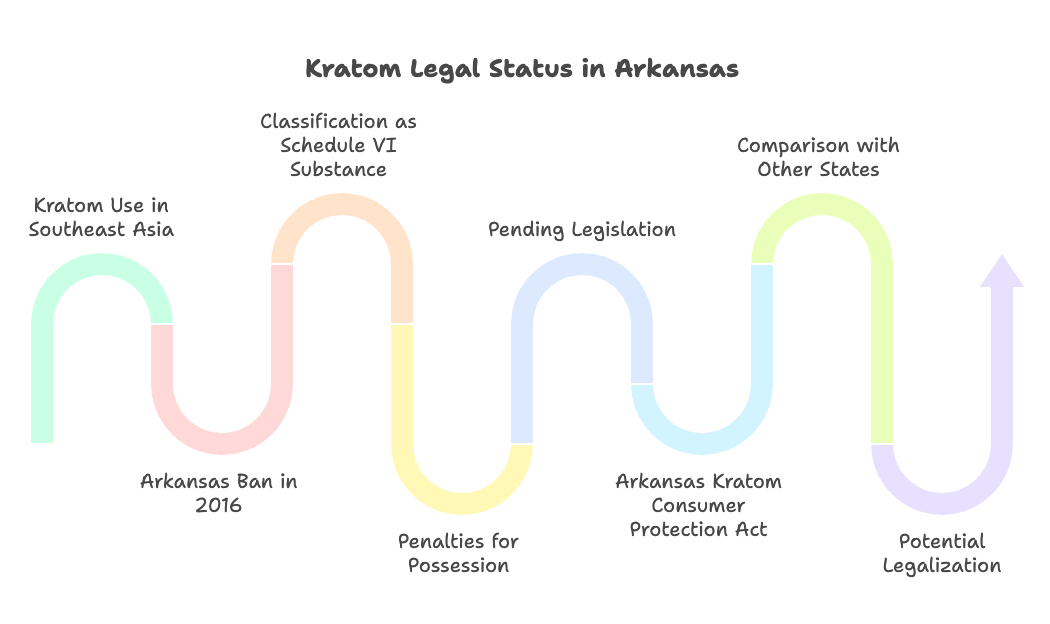Kratom in Arkansas 2025: Current Ban with Pending Legislation
Arkansas residents looking for natural wellness options often ask about kratom legal status in their state. The answer is clear but complicated. Kratom is currently illegal in Arkansas, but things might change soon.
Table of Contents
- What is Kratom?
- Is Kratom Legal in Arkansas? Current Status
- Arkansas Kratom Penalties: What You Need to Know
- Why Did Arkansas Ban Kratom?
- Pending Legislation: Hope for Change
- How Other States Handle Kratom
- What Arkansas Residents Should Know
- The Science Behind Kratom
- Quality and Safety Considerations
- What to Expect from Potential Legalization
- Key Takeaways
- Frequently Asked Questions
This guide covers everything you need to know about kratom Arkansas law in 2025. We'll look at current rules, possible changes, and what this means for people interested in kratom.
What is Kratom?
Kratom comes from a tree that grows in Southeast Asia. The leaves contain natural compounds that people have used for centuries. Many folks use kratom powder, capsules, or extracts for various reasons.
The plant's scientific name is Mitragyna speciosa. It belongs to the coffee family. Different kratom strains may offer different experiences for users.
Is Kratom Legal in Arkansas? Current Status
Is kratom illegal in Arkansas? Yes, it is. Arkansas banned kratom in 2016 when lawmakers added it to the state's controlled substances list.
The ban makes kratom a Schedule VI controlled substance. This puts it in the same category as some prescription drugs. Arkansas kratom laws treat possession and sale seriously.
Arkansas Kratom Penalties: What You Need to Know

Arkansas kratom penalties can be harsh. The state doesn't take kratom possession lightly. Here's what could happen if you're caught with kratom in Arkansas.
Possession of any amount might lead to misdemeanor charges. First-time offenders could face fines up to $2,500. Jail time of up to one year is also possible.
Is kratom a felony in Arkansas? It depends on the amount and circumstances. Large quantities or intent to sell could result in felony charges. These carry much heavier penalties.
Why Did Arkansas Ban Kratom?
Arkansas lawmakers cited safety concerns when they banned kratom in 2016. They worried about potential health risks and lack of regulation. The state wanted to protect residents from unknown substances.
Some officials compared kratom to other controlled substances. They felt a ban was the safest approach. This decision put Arkansas among the states with strict kratom laws.
Pending Legislation: Hope for Change
Good news might be coming for kratom in Arkansas. New legislation could change the current ban. Several bills have been introduced to regulate rather than prohibit kratom.
The proposed Arkansas Kratom Consumer Protection Act would create a legal framework. This would allow kratom sales with proper testing and labeling. Age restrictions and quality standards would protect consumers.
Supporters argue that regulation works better than prohibition. They point to other states with successful kratom laws. These states allow kratom while ensuring product safety.
How Other States Handle Kratom
Most US states allow kratom with some regulations. Only six states currently ban kratom completely. Arkansas is one of them, along with Alabama, Indiana, Rhode Island, Vermont, and Wisconsin.
States like Florida and Texas have kratom consumer protection acts. These laws ensure product quality and safety. They also set age limits and labeling requirements.
Many kratom users prefer regulated markets. Quality products like White Maeng Da kratom capsules are available in legal states. Proper testing ensures purity and potency.
What Arkansas Residents Should Know
Kratom Arkansas residents should stay informed about law changes. Following pending legislation helps you understand your options. The legal landscape may shift in the coming months.
If you're interested in kratom, consider these facts. Many people use kratom as part of their wellness routine. Popular options include Red Maeng Da kratom capsules and powder forms.
Different strains may offer different experiences. Red strains are often chosen for evening use. Green and white strains might be preferred during the day.
The Science Behind Kratom
Research on kratom continues to grow. Scientists study its active compounds called alkaloids. The main ones are mitragynine and 7-hydroxymitragynine.
These compounds interact with certain receptors in the body. This may explain why people report various effects from kratom use. More research could help inform better policies.
The American Kratom Association supports scientific studies. They want evidence-based decisions about kratom regulation. This approach could benefit Arkansas residents in the future.
Quality and Safety Considerations
When kratom becomes legal, quality matters most. Reputable vendors test their products for purity. They check for contaminants like heavy metals and bacteria.
Products like kratom tinctures require careful manufacturing. Proper extraction methods preserve beneficial compounds. Quality control ensures consistent potency.
Flavourz Kratom sets high standards for their products. They use third-party testing to verify quality. This gives customers confidence in what they're buying.
What to Expect from Potential Legalization
If Arkansas legalizes kratom, expect strict regulations. The state will likely require testing and labeling. Age restrictions will probably apply to all kratom products.
Licensed vendors would need to follow specific rules. This might include storage requirements and record keeping. Consumer safety would be the top priority.
Legal kratom markets typically offer more variety. Customers can choose from different strains and forms. Options might include powders, capsules, and liquid extracts.
Key Takeaways
- Kratom is currently illegal in Arkansas as of 2025
- Arkansas kratom laws classify it as a Schedule VI controlled substance
- Arkansas kratom penalties can include fines up to $2,500 and jail time
- Pending legislation might change the ban to regulation
- Most other US states allow kratom with proper oversight
- Quality and testing are important when kratom is legal
- The Arkansas Kratom Consumer Protection Act could create a legal framework
- Scientific research continues to inform kratom policy decisions
Frequently Asked Questions
Is kratom legal in Arkansas 2025? No, kratom remains illegal in Arkansas as of 2025. It's classified as a Schedule VI controlled substance, making possession and sale against state law.
What are the penalties for kratom in Arkansas? Penalties can include fines up to $2,500 and up to one year in jail for possession. Larger amounts or intent to sell could result in felony charges with heavier penalties.
Could kratom become legal in Arkansas soon? Yes, there's pending legislation that could change the current ban. The proposed Arkansas Kratom Consumer Protection Act would regulate rather than prohibit kratom.
Why did Arkansas ban kratom? Arkansas banned kratom in 2016 due to safety concerns and lack of regulation. Lawmakers wanted to protect residents from what they saw as unknown health risks.
How many states ban kratom? Only six states currently ban kratom completely: Arkansas, Alabama, Indiana, Rhode Island, Vermont, and Wisconsin. Most states allow kratom with some regulations.
What would happen if Arkansas legalizes kratom? If legalized, Arkansas would likely implement strict regulations including product testing, labeling requirements, age restrictions, and licensed vendor requirements to ensure consumer safety.
Advice & articles
-
Green Hulu Kapuas Kratom: Complete 2025 Strain Guide & Effects
7th Aug 2025Green Hulu Kapuas kratom stands out as one of the most interesting strains available today. This un
-
Kratom in Arkansas 2025: Current Ban with Pending Legislation
7th Aug 2025Arkansas residents looking for natural wellness options often ask about kratom legal status in thei
-
Best Kratom Tablet Vendors Online 2025: Lab-Tested & AKA-Verified
7th Aug 2025Finding the best kratom vendors online can feel overwhelming with so many options available. Qualit
- Read more articles





